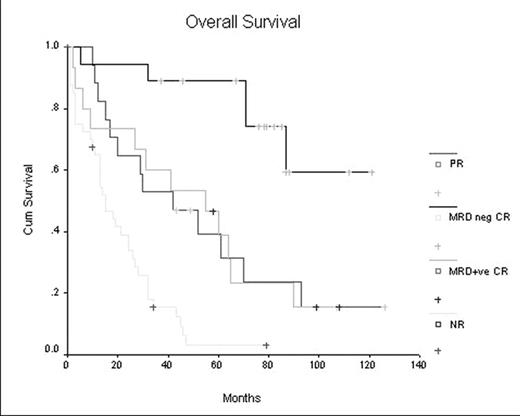Abstract
Eradication of minimal residual disease (MRD) in chronic lymphocytic leukemia (CLL) is emerging as a desirable therapeutic end point predicting for better outcome. The monoclonal antibody alemtuzumab (Mabcampath) is approved for patients with fludarabine refractory CLL. We previously published 91 patients with relapsed CLL (74 men and 17 women, median age 58 years [range, 32 to 75 years]; 44 fludarabine-refractory) who received a median of 9 weeks (range 1 to 16) of alemtuzumab, 30mg 3x a week after dose escalation, between 1996 and 2003. 84 patients had i.v. alemtuzumab and 7 received it subcutaneously. Responses to alemtuzumab according to NCI-WG criteria were complete remission (CR) in 32 patients (36%), partial remission (PR) in 17 (19%) and no response (NR) in 42 (46%). Detectable CLL to a level of less than one CLL cell in 10,000 leucocytes, assessed by four-color MRD flow cytometry, was eradicated from the blood and marrow in 18 patients (20%). 8 of these 18 patients were fludarabine refractory. We report here the results of long term follow up of this cohort of patients after a median follow up of 77 months (range 5 to 123 months). Median survival was significantly longer in patients achieving MRD negative responses compared with those with detectable CLL at the end of therapy. The median survival for all 18 MRD negative responders has not been reached but was 87 months for the 8 fludarabine-refractory patients achieving MRD negativity. Overall survival for the 18 patients with MRD-negative remissions was 66% at 72 months (see Figure). MRD positive CR patients had a median survival of 56 months, MRD positive PR patients a median survival of 42 months and non-responders a median survival of 14 months. The median treatment-free interval prior to alemtuzumab for the 18 MRD negative patients was 8 months (range 4 to 35). Excluding planned stem cell transplantation performed in CR, the median time to next treatment for the 18 MRD negative patients was 114 months and 72% (13/18) have required no further therapy. Therefore alemtuzumab can induce MRD negative remissions in CLL resulting in a clear survival advantage with 66% of MRD negative patients alive 6 years after alemtuzumab. The markedly increased treatment-free survival and excellent survival for MRD negative patients strongly suggests that achieving an MRD negative remission is an appropriate therapeutic end-point in relapsed CLL.
Author notes
Disclosure:Research Funding: Dr H A Sayala’s research is supported by an unrestricted educational grant from Schering Health Care Ltd (currently Bayer).


This feature is available to Subscribers Only
Sign In or Create an Account Close Modal